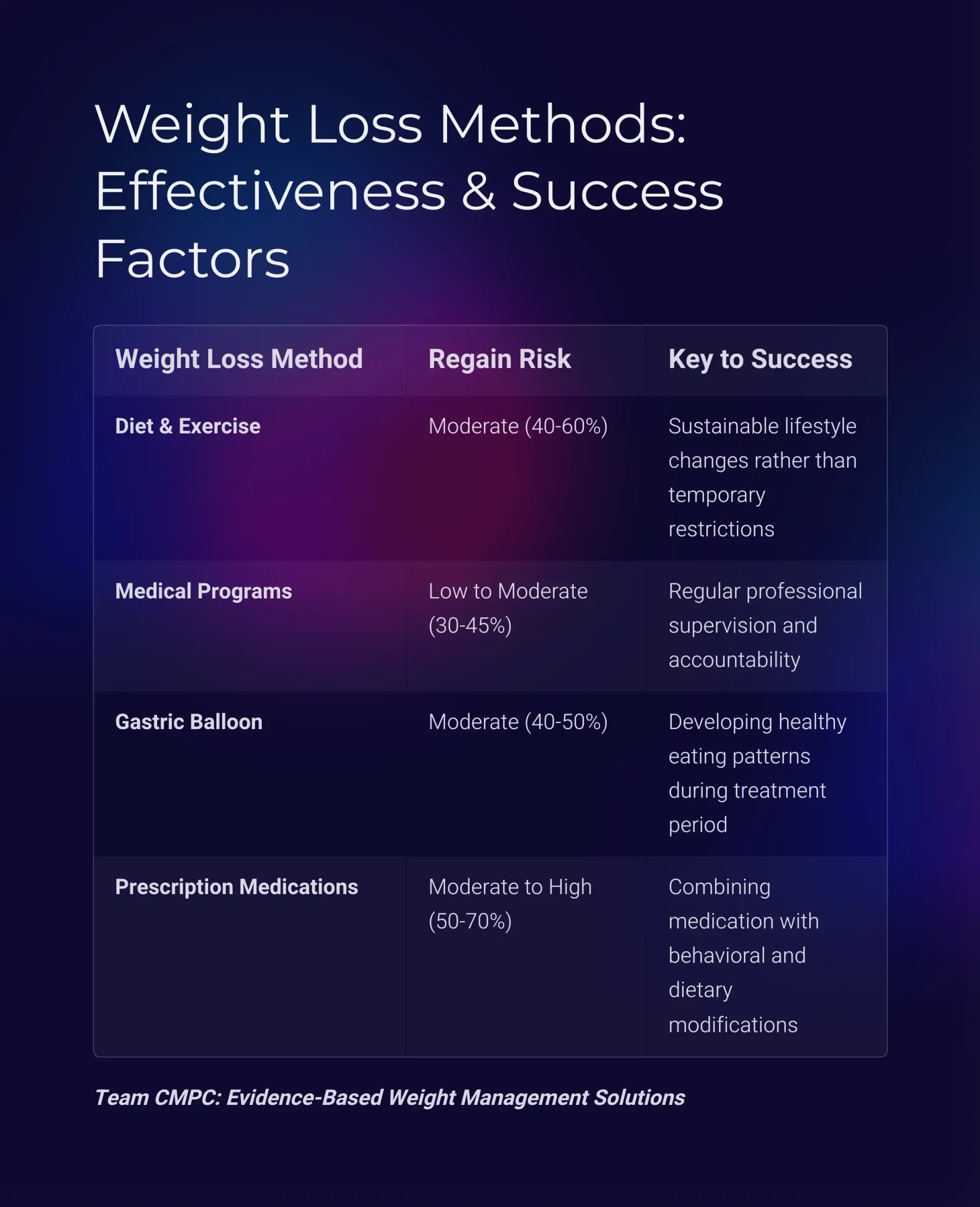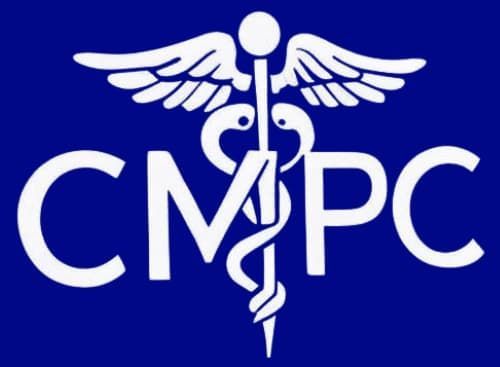
One of the most common concerns among individuals considering weight loss solutions is whether the results will be long-lasting or if the weight will return over time. This question expresses a genuine concern felt by many individuals who have encountered the disappointment of shedding pounds, only to regain them after months or years.
Weight loss is an important milestone, but maintaining it requires ongoing effort and lifestyle changes. The permanence of weight loss depends on various factors, including the chosen method, individual commitment, and long-term behaviour modifications.
4 Vital Factors Affecting Long-Term Weight Loss Maintenance

1. Type of Weight Loss Approach Used
The method you choose to lose weight determines your long-term success. Different approaches offer varying levels of sustainability:
- Diet and Exercise
- Medical Weight Loss Programs
- Non-Surgical Interventions
- Psychological Support Systems
Diet and Exercise: This traditional approach remains the foundation of sustainable weight loss. When done correctly, balanced nutrition and regular physical activity create a lifestyle change rather than a temporary fix. Studies consistently show that individuals who lose weight gradually (about 0.5-1 kg per week) through healthy eating and increased physical activity tend to maintain their results longer.
However, it’s important to distinguish between sustainable dietary changes and fad diets. Crash diets or extreme calorie restriction might deliver quick results, but they often lead to rapid weight regain once normal eating patterns resume. This yo-yo effect can be more harmful than maintaining a stable weight, as it may slow your metabolism over time and make future weight loss more difficult.
Medical Weight Loss Programs: These structured programs typically combine multiple evidence-based approaches under professional supervision. They often include supervised meal replacements, prescription medications when appropriate, and regular behavioural therapy sessions. The advantages of these programs are their comprehensive nature and the accountability they provide.
Medical weight loss programs are especially beneficial for individuals looking for substantial weight loss or those facing obesity-related health issues. Professional guidance aids in navigating challenges and adapting strategies according to individual progress and needs.
Non-Surgical Interventions: Innovative solutions like the Allurion Gastric Balloon represent an intermediate step between lifestyle changes and surgical interventions. These options can help kickstart weight loss by physically reducing stomach capacity, creating a feeling of fullness with smaller portions.
While procedures like gastric balloons are temporary (typically removed after 4-6 months), they provide a valuable learning period during which patients can adapt to smaller portions and healthier eating habits. The success rate for maintaining weight loss after balloon removal is significantly higher when patients use this period to establish new lifestyle patterns so they can continue following the procedure.
2. Commitment to Lifestyle Changes
Weight maintenance highly depends on long-term healthy habits that become your new normal rather than temporary measures. These include:
- Healthy Eating Habits
- Regular Physical Activity
- Behavioural and Psychological Support
- Sleep and Stress Management
Healthy Eating Habits: Sustainable weight maintenance requires a permanent shift in your relationship with food. This doesn’t mean restrictive dieting forever but rather developing a balanced approach to nutrition that you can maintain for life. Key strategies include emphasizing whole, unprocessed foods like fruits, vegetables, lean proteins, and whole grains while limiting processed foods high in sugar and unhealthy fats.
Mindful eating practices also play a vital role in long-term success. Recognizing proper hunger cues, eating slowly, and enjoying meals without distractions help prevent the mindless overeating that can lead to weight regain. Portion control remains essential even after reaching your goal weight, as it helps maintain the calorie balance needed for weight stability.
Regular Physical Activity: Exercise is a tool for weight loss and critical to successful maintenance. Physical activity helps preserve lean muscle mass, which supports a healthy metabolism. Aim for at least 150 minutes of moderate weekly exercise, including cardiovascular activities and strength training.
Finding activities you genuinely enjoy increases the likelihood you’ll maintain them long-term. Whether it’s dancing, hiking, swimming, or team sports, the best exercise for weight maintenance is the one you’ll do consistently. Remember that physical activity has numerous health benefits beyond weight control, including improved mood, better sleep, and reduced risk of chronic diseases.
Behavioural and Psychological Support: The psychological aspects of weight management are often underestimated but critically important. Many people develop emotional eating patterns, using food to cope with stress, boredom, or negative emotions. Addressing these triggers through counselling, support groups, or coaching can provide lasting strategies for managing emotional eating.
Building a positive relationship with food and body image supports long-term success. It might involve working with a therapist to address underlying issues or joining support groups where you can share experiences with others on similar journeys. The accountability and encouragement from these support systems significantly improve maintenance rates.
Sleep and Stress Management: Often overlooked factors in weight management include adequate sleep and effective stress management. Poor sleep disrupts hunger hormones, increasing appetite and cravings for high-calorie foods. Similarly, chronic stress can trigger emotional eating and fat storage, particularly around the abdomen.
Healthy sleep routines and stress-reduction techniques such as meditation, deep breathing exercises, or yoga can support your weight maintenance efforts by addressing these physiological factors.
3. Metabolic Adaptation
After significant weight loss, the body naturally attempts to regain weight through various physiological mechanisms. Understanding these processes can help you counteract them effectively:
- Metabolic Slowdown
- Hunger Hormone Changes
- Adaptive Strategies
- Muscle Preservation
Metabolic Slowdown: When you lose weight, your body requires fewer calories for basic functions. This reduction occurs partly because there’s less tissue to maintain and partly as a protective mechanism to prevent further weight loss. This metabolic adaptation can persist for months or even years after weight loss, making maintenance challenging.
Gradually adjust your calorie intake rather than dramatically reducing it to combat this natural process. This slower approach adapts your metabolism without triggering severe energy conservation mechanisms. Regular monitoring can help you identify and address significant metabolic changes before they lead to substantial weight regain.
Hunger Hormone Changes: Weight loss affects key hormones that regulate appetite and satiety. Ghrelin, the hunger hormone, often increases after weight loss, while leptin, which signals fullness, may decrease. This hormonal imbalance can create persistent hunger that makes maintenance difficult.
Strategies to manage these hormonal changes include eating protein with every meal, which helps control hunger, maintaining regular eating schedules to stabilize hormone cycles, and practicing mindful eating to recognize true hunger versus cravings better.
Adaptive Strategies: As your body adapts to weight loss, your maintenance strategy may also need to evolve. It might mean increasing physical activity gradually to offset metabolic slowdown or periodically reassessing your calorie needs with a healthcare provider.
Some individuals benefit from calorie cycling, varying calorie intake throughout the week while maintaining the same overall average, which may help prevent metabolic adaptation. Others find intermittent fasting supports long-term maintenance by improving insulin sensitivity and control of hunger.
Muscle Preservation: Maintaining or building muscle mass is crucial for long-term weight management. Muscle tissue burns more calories at rest than fat tissue, supporting a higher metabolic rate. Regular strength training, combined with adequate protein intake (about 1.6 to 2.2 grams per kilogram of body weight daily), helps preserve muscle mass during and after weight loss.
4. Common Causes of Weight Regain
Understanding the typical pitfalls in weight maintenance can help you avoid them. Weight regain commonly occurs due to:
- Returning to Old Eating Habits
- Lack of Ongoing Support
- Stress and Emotional Triggers
- Medical Conditions
Returning to Old Eating Habits: Perhaps the most common reason for weight regain is gradually slipping back into previous eating patterns after reaching a weight goal. It often happens subtly: portion sizes creep up, meal skipping returns, or processed convenience foods replace whole food options more frequently.
Preventing this pattern requires vigilance and recognizing that weight management is a lifelong practice rather than a temporary project. Regular self-monitoring through food journals or tracking apps can help identify small changes before they become problematic habits.
Lack of Ongoing Support: Many structured weight loss programs provide intensive support during the active weight loss phase but offer limited guidance for maintenance. Without continued accountability and encouragement, motivation may wane over time.
Creating your support system for the maintenance phase, whether through regular check-ins with healthcare providers, continued participation in support groups, or establishing accountability partnerships, can fill this gap and significantly improve long-term outcomes.
Stress and Emotional Triggers: Life inevitably brings periods of stress, emotional challenges, and disruptions to routine. Without effective coping strategies, these situations can trigger returns to comfort eating or neglect of healthy habits.
Developing a maintenance toolkit of stress management techniques, emergency self-care strategies, and alternative coping mechanisms prepares you to navigate difficult periods without compromising your weight management goals. Remember that occasional setbacks are normal, and the pattern over time matters most.
Medical Conditions: Sometimes, weight regain occurs despite adherence to healthy habits due to underlying medical issues. Hormonal changes, thyroid disorders, medication side effects, or other health conditions can affect metabolism and make maintenance more challenging.
Regular medical check-ups allow for early identification and management of these factors. If you notice unexpected weight changes despite maintaining your habits, consult your healthcare provider to investigate potential medical causes.
4 Effective Strategies to Maintain Weight Loss Permanently
Implementing specific, evidence-based strategies significantly improves your chances of long-term weight maintenance:
1. Set Realistic Goals
- Focus Beyond the Scale
- Celebrate Non-Weight Victories
- Establish Maintenance Ranges
- Create Progressive Fitness Goals
Weight management success extends far beyond what the scale shows. Setting diverse goals related to energy levels, fitness capabilities, clothing fit, and health markers provides multiple ways to measure progress and maintain motivation. For instance, tracking blood pressure and cholesterol levels or resting heart rate improvements offers concrete evidence of health benefits even when weight remains stable.
Celebrating non-scale victories, like climbing stairs without getting winded, reducing medication dosages with your doctor’s approval, or simply feeling more comfortable in your body, reinforces the value of your healthy habits beyond weight control. These victories often provide stronger motivation for continued effort than weight measurements alone.
Establishing a maintenance weight range rather than a single target number acknowledges normal weight fluctuations and prevents discouragement from minor variations. A typical maintenance range might span 2-3 kg, allowing for normal volatility due to hydration, hormones, or seasonal changes without triggering unnecessary concern.
Creating progressive fitness goals keeps your exercise routine challenging and engaging. Whether it’s increasing your walking distance, adding resistance to strength training, or learning new activities, continuous improvement in physical capabilities supports both weight maintenance and overall health.
2. Regular Monitoring
- Consistent Weigh-Ins
- Food and Activity Tracking
- Body Composition Assessment
- Health Marker Monitoring
Regular monitoring provides early detection of weight regain trends, allowing for prompt adjustments before small changes become significant. Research consistently shows that individuals who maintain regular weigh-ins (typically once weekly) are more successful at long-term weight maintenance. These check-ins provide objective feedback and accountability.
Food and exercise journals remain valuable tools even in the maintenance phase. Whether using paper journals, smartphone apps, or simple photo records of meals, tracking helps maintain awareness of eating patterns and activity levels. Many successful maintainers continue some form of monitoring, even if less detailed than during active weight loss.
Periodically assessing body composition (the ratio of fat to lean mass) provides more meaningful information than weight alone. As fitness improves, muscle development may offset fat loss on the scale. Body composition measurements through bioelectrical impedance scales or professional assessments help track these beneficial changes.
Regular monitoring of health markers such as blood pressure, blood sugar, and cholesterol levels motivates improved clinical outcomes. These objective measurements often respond quickly to healthy lifestyle changes and reinforce maintenance efforts’ value even when weight remains stable.
3. Continued Medical Support
- Regular Healthcare Provider Check-ins
- Nutritionist Consultations
- Fitness Expert Guidance
- Psychological Support
The transition from active weight loss to maintenance represents a critical period where professional guidance can be particularly valuable. Regular check-ins with healthcare providers help assess progress, address challenges, and adjust strategies based on changing needs or circumstances.
Periodic consultations with registered dietitians or nutritionists provide expert guidance on maintaining nutritional balance while managing weight. These professionals can help adjust eating plans as your activity levels, life circumstances, or health conditions change. Seasonal menu planning and strategies for navigating challenging eating situations (like holidays or travel) are particularly valuable topics to address.
Fitness experts can help update and refresh your exercise routine to prevent plateau, maintain motivation, and address developing physical limitations. Whether through personal training sessions, group classes, or periodic fitness assessments, professional guidance ensures your activity remains effective and safe.
For many individuals, ongoing psychological support plays a crucial role in maintaining behavioural changes and addressing emotional eating patterns. It might involve continued therapy sessions, support group participation, or regular coaching check-ins. These resources provide tools for managing stress, building body positivity, and maintaining motivation through life’s inevitable challenges.
4. Practice Long-Term Mindset
- Gradual Progress Over Quick Fixes
- Lifestyle Integration
- Self-Compassion After Setbacks
- Identity-Based Habits
Successful weight maintainers consistently demonstrate a patient, long-term perspective rather than seeking immediate results. This mindset recognizes that sustainable progress often occurs slowly and values consistency over perfection. Rather than viewing weight management as a finite project with a completion date, this approach accepts it as an ongoing practice, similar to dental hygiene or other health maintenance activities.
Integrating healthy habits into your lifestyle so that they become automatic rather than effortful represents a key maintenance strategy. Maintenance becomes significantly easier when nutritious eating, regular activity, and self-care become your default patterns rather than conscious exceptions. This integration often takes time, and research suggests that new habits typically require 66 days or more to become automatic.
Practicing self-compassion after inevitable setbacks prevents the all-or-nothing thinking that often derails maintenance efforts. Rather than viewing a single overindulgence or missed workout as a failure, successful maintainers treat these events as temporary detours and promptly return to their established healthy patterns. This resilience significantly improves long-term outcomes.
Perhaps most powerfully, developing an identity-based approach to maintenance transforms “doing healthy behaviours” into “being a healthy person.” When healthy choices align with your self-perception rather than contradicting it, maintenance becomes an expression of your identity rather than a restriction you impose upon yourself.
Does the Type of Weight Loss Method Impact Regain Risk?
Different weight loss approaches carry varying levels of regain risk. Understanding these differences can help you choose the method best suited to your circumstances and prepare for maintenance challenges:

Diet and Exercise: Traditional lifestyle modifications carry a moderate regaining risk, primarily because they require significant self-motivation and consistency without the structure of medical interventions. Success rates improve substantially when the approach focuses on sustainable changes rather than severe restrictions. Regular physical activity, particularly when it includes strength training, significantly reduces the risk by preserving muscle mass and metabolic health.
Medical Weight Loss Programs: Comprehensive programs combine multiple evidence-based approaches under professional supervision, typically resulting in lower regain rates than self-directed efforts. The accountability, regular monitoring, and personalized adjustments characteristic of these programs help address challenges before they lead to significant regain. Programs with a dedicated maintenance phase and gradually decreasing support show auspicious long-term outcomes.
Gastric Balloon: Non-surgical interventions like the Allurion Gastric Balloon provide a valuable learning period for patients to develop new eating habits while experiencing physical appetite control. The moderate regain risk following balloon removal decreases significantly when patients use the treatment period to establish sustainable lifestyle changes they continue after the procedure. The temporary nature of this intervention underscores the importance of viewing it as a tool for learning rather than a permanent solution.
Prescription Medications: Weight management medications work through various mechanisms to reduce appetite, increase satiety, or affect metabolism. While effective during active treatment, these medications typically carry a higher regain risk when discontinued, highlighting the importance of concurrent lifestyle modifications. The newest generation of drugs shows promising maintenance results with continued use, though long-term studies remain ongoing.
We hope you found the information helpful.
Let’s quickly recap
While weight loss is achievable through various methods, maintaining it long-term requires a combination of healthy habits, behavioural changes, and ongoing support. The journey to lasting weight management is deeply personal, with each individual finding their unique combination of strategies that work for their lifestyle, preferences, and circumstances.
Whether you choose diet and exercise, medical interventions, or non-surgical options like the Allurion Gastric Balloon, consistency, commitment, and a sustainable lifestyle approach remain the keys to preventing weight regain. Rather than viewing maintenance as the “end” of your weight loss journey, consider it an ongoing practice of self-care that supports your overall health and well-being.
Remember that occasional fluctuations are normal and don’t define your success. The ability to recognize challenges early, adjust your approach as needed, and maintain a compassionate yet consistent attitude toward yourself ultimately determines long-term outcomes.
Consulting with healthcare professionals can help develop a personalized maintenance plan tailored to your needs, preferences, and goals. Their expertise provides valuable guidance through the transitions and challenges that inevitably arise during the maintenance phase.
Ready to take the first step toward sustainable weight management?
Contact us today for a FREE consultation where we can answer all your questions and help you determine which non-surgical weight loss option might be right for you.
Our expert team is committed to making your weight loss journey as comfortable and successful as possible during the active loss phase and throughout the following maintenance journey. With the proper support, strategies, and mindset, lasting weight management is achievable.










